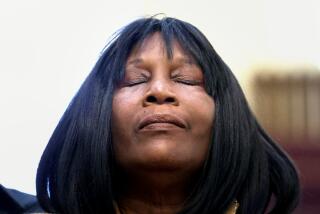Aurora shooting trial: James Holmes, as seen through his mother’s tearful eyes
- Share via
This is how you try to make a mass murderer seem like a human being.
You show the jury his birth announcement: James Eagan Holmes, 7 pounds, 5 ounces, 20 inches. You play video of him as a laughing little boy cutting out gingerbread Christmas trees with his grandmother and struggling to pick out “Jingle Bells” on the piano.
And you put his tearful mother on the witness stand to talk about the pain and guilt that have consumed her since her child murdered 12 people and wounded 70 others in an Aurora, Colo., multiplex three years ago.
Arlene Rosemary Holmes, 61, spoke at length Wednesday for the first time. All she wants is for her son to have a chance to spend the rest of his life in prison. As she wrote in her prayer journal nine months after her son’s rampage, “More death does not restore life.”
“He never harmed anyone, ever — ever — until July 20, 2012,” she told jurors, who could sentence James Holmes to death within the next few weeks. “I understand he has a serious mental illness. He didn’t ask for that. Schizophrenia chose him. He didn’t choose it.
“I still love my son,” she said, choking up. “I do.”
As the lengthy trial grinds on, Robert and Arlene Holmes sit in Division 201 of the Arapahoe County Justice Center, motionless and stoic, a row or two back from their son, who is now a convicted mass murderer. Sometimes tears roll down their cheeks. Many days, they take notes. They are always silent.
Until this week. That’s when defense attorneys in James Holmes’ death penalty trial neared the end of the so-called mitigation phase — the time when they try to convince jurors that one of the deadliest mass shooters in American history should be granted mercy.
This week, attorneys called the two witnesses who love Holmes the most, who have stood by him as the horrors mounted — the people who could talk about the 27-year-old’s life in a way that no others could. His parents.
Robert Holmes went first, in testimony that began Tuesday and ended Wednesday morning.
Defense attorney Tamara Brady: “What’s your fondest memory of your son?”
Robert Holmes: “Probably when he was playing soccer. When we were in Oak Hills” — a community near Castroville, Calif. “That was probably the happiest time of his life. It was probably ours, too.”
And it ended 20 or so years ago.
Arlene Holmes remembers a child who was, as she told the jury, “planned for and wanted and hoped for and waited for. It was this miracle. We wanted a child and had one.”
She took off time from work, and the young couple did without her income so they could spend more time with their baby, the first grandchild on either side of the family.
“It was what we had prayed for,” she said.
As an elementary school child, he was crisply organized. Every toy in his bedroom was lined up neatly. His “Goosebumps” books were shelved, his mother said, “in order of acquisition.” He was 9 years old, and he wanted to please everyone.
He decided he wanted to be a neuroscientist when he was 14, a time when his natural quietness took a turn for the worse. He never liked talking on the phone, Arlene Holmes said, so she coached him.
“He was in middle school, and there were times that he had to communicate by phone,” she said. “It was before the days when everybody just texted and tweeted and really didn’t call each other.... We would have a dry run and actually practice using the phone so he wouldn’t get too stressed.”
That isolation, his parents testified this week, cloaked his actions in the months before the massacre.
When he was buying weapons, practicing at a shooting range, amassing the body armor he would wear during the assault. When he was breaking up with his girlfriend and dropping out of school. When he was spiraling further and further away from the child who never bothered anybody.
Not long before the shooting, the University of Colorado psychiatrist who treated him in 2012 called Arlene Holmes out of concern. But Dr. Lynne Fenton never told James Holmes’ mother that he had cut off treatment, that he might be psychotic, that he had expressed homicidal ideation.
Defense attorney Rebecca Higgs: “Do you wish she had told you?”
Arlene Holmes, sobbing on the stand: “We wouldn’t be here today ... I’d be crawling on all fours to get to him.... She didn’t tell me. She didn’t tell me. She didn’t tell me.”
The killer and his parents rarely heard each other’s voices in 2012, because James Holmes’ usual form of communication was email. Visits in person were few and far between. But he did check in on Mother’s Day, two months or so before the rampage.
“He said, ‘I’m having trouble in school; I’m having trouble with presentations,’” Arlene Holmes recounted Wednesday. “Doing what I thought was right was to encourage him — to remind him that he did well in presentations back in his era.
“I kept telling him, ‘Keep trying, keep trying.’ But I ... ” She stopped. She cried. She started in again, apologetic.
“Excuse me. But I didn’t realize that his loudest cry for help was his silence.”
Follow @marialaganga for national news
ALSO:
University of Cincinnati officer charged with murder in Sam DuBose shooting
Maddy Middleton killing: ‘We are going to bring him to justice,’ D.A. says
More millenials are living at home, and you can’t blame the economy
More to Read
Sign up for Essential California
The most important California stories and recommendations in your inbox every morning.
You may occasionally receive promotional content from the Los Angeles Times.











